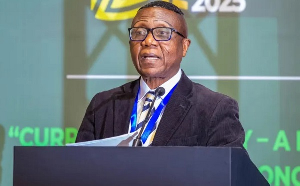Accra, Oct 19, GNA - A large number of hospitals in Ghana accept medical donations, without the adhering to international or local drug donation guidelines, a collaborative study by the Catholic Drug Centre and the Ecumenical Pharmaceutical Network (EPN) has revealed. The research stated that without the adherence to guidelines, patients could have been given drugs that were out of date.
Mrs Heather Budge-Reid, a Consultant, announced this at the opening of a three-day stakeholder dissemination workshop on "Access to Medicine in Church Health Facilities and their Clients in Ghana". The research was carried out in 10 church health services, including those of the Catholic Church, the Methodist and Presbyterian Churches across the country by Mr Isaac Annan, Head of the Catholic Drug Centre and Mr Stephen Essuman, Head of Diocesan Hospital Pharmacy, Sunyani, under the 'EPN Guidelines Project.
The EPN Guidelines Project is part of the EPN programme entitled: =93Maximizing Access to Essential Medicines for Church Health Service and their Client."
Twenty participants from selected faith based health service institutions are attending the workshop in Accra to dialogue with the researchers on how to incorporate the finding into their services to enable them to serve their clients better.
Mrs Budge-Reid said the faith-base health service provider in Ghana provided approximately 40 per cent of the available health care, through its 56 hospitals and 83 clinics.
"There is, however, a relatively low level of implementation of standard operating procedures in most of the institutions," she said. Mrs Budge-Reid said what was most gratifying about the research was the fact that all the institutions enjoyed government support through the payment of salaries of staff and tax exemptions.
"Information sharing and representation opportunities indicate that there is a good degree of integration between government and church health service," she said.
Mr Philibert Kankye, Executive Secretary of the Christian Health Association of Ghana (CHAG), expressed his appreciation for the research, saying, "the findings of this survey draws the attention of CHAG to very important health service management challenges, which we perhaps took for granted because we could not substantiate them or imagine the seriousness of them".
He said CHAG would use the findings to undertake the necessary advocacy activities that would benefit the over 40 per cent poor Ghanaians that depended on the church health service for their health needs.
"We shall ensure a significant improvement in the access to quality medicine to our clients," Mr Kankye said.
Mr Charles Allotey, Director, Health Access Network, a nongovernmental organisation, said the Network was collaborating with the pharmacy unit of the Ghana Health Service to put together a proposal for structured continuing education programme for pharmacy and other health staff throughout the country.
The programme, he noted, was to develop local capacity and to provide a framework for self-sufficiency, sustainability and transparency in pharmaceutical supply management. 19 Oct. 06
General News of Thursday, 19 October 2006
Source: GNA












